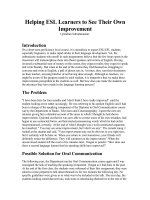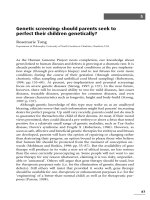Helping ESL Learners to See Their Own Improvement
Bạn đang xem bản rút gọn của tài liệu. Xem và tải ngay bản đầy đủ của tài liệu tại đây (61.4 KB, 3 trang )
Helping ESL Learners to See Their Own
Improvement
Upendran Subrahmanian
Introduction
On a short-term proficiency level course, it is unrealistic to expect ESL/EFL students,
especially beginners, to make rapid strides in their language development. Yet, the
enthusiastic students who enroll in such programmes believe that the few hours spent in the
classroom will metamorphose them into fluent speakers and writers of English. Having
invested a substantial sum of money on the course, they expect results; they expect to speak
and write fluently. But when at the end of the course they find themselves struggling to
converse and write in English, a pall of gloom sets in. At times, they vent their frustration
on their teacher, accusing him/her of not having done enough. Although as teachers, we
might be aware of the progress made by each student, it is imperative that we make these
improvements perceptible to the students as well. But how does one make the students see
the advances they have made in the language learning process?
The Problem
"I have been here for four months and I don't think I have really improved", said the
student looking at me rather accusingly. He was referring to his spoken English; and I had
been in charge of the speaking component of the Diploma in Oral Communication course
run by the Department of Radio, Television and Cinematography. I spent the next ten
minutes giving him a detailed account of the areas in which I thought he had shown
improvement. I pointed out that he was now able to correct some of his own mistakes, had
begun to use contracted forms, and had started pronouncing words which he had earlier
mispronounced, correctly. At the end of what I thought was a well-constructed argument,
he remarked, " You may see some improvement, but I don't see any". The remark stung. I
looked at the student and said, "Your improvement may not be obvious to you right now,
but it certainly will be later on. When you return to your hometown, your friends will
definitely notice the difference. They will comment on the improvement." When the
unconvinced student left the room a few minutes later, I began to ponder: "How does one
show a second language learner that his speaking skills have improved?"
Possible Solution for Oral Communication
The following year, the Department ran the Oral Communication course again and I was
reassigned the task of teaching the speaking component. I began as I had done in the past.
At the end of the first class, the students were informed of their first assignment; they were
asked to come prepared to talk about themselves for two minutes the following day. No
specific guidelines were given as to what was to be included in the talk. The next day, the
students looking somewhat nervous, took turns in introducing themselves to the rest of the
class. Most spoke for less than a minute, and none exceeded the two minutes that had been
allotted to them. As I had done in the previous years, I recorded all the talks. But this time,
however, instead of erasing the tape after I had listened to it, I preserved it. While listening,
I noted the errors that each student had made and this helped me to finalize the areas I
should focus on. The students were not given an opportunity to listen to this talk.
During the next fifteen weeks, the participants worked on various assignments; the
performance of each student on each assignment was discussed in detail in class. A week
before the semester end exam, the students were given their final assignment. They were
asked to come prepared to talk about themselves; this time, the duration of the talk was
increased to five minutes. The talks were as usual recorded and this time several students
exceeded the five-minute mark. The following day, I made each student listen to his first
talk and compare it with the final one. Many laughed when they heard their first version; in
fact, very few remembered that they had given such a talk in the first week of the semester.
As they listened, students were quick to pounce on grammatical and pronunciation errors
made in the first talk. They were both shocked and amused by the number of "silly errors"
they had made. After listening to the two talks, there was a consensus that the second talk
was a tremendous improvement on the first. All students concluded that the Oral
Communication course had indeed helped them become better speakers of English.
Solution for Writing
In 1994, while. at the University of Georgia, I was hired by the American Language
Program to teach grammar to ESL/EFL learners. On the first day of class, I asked the
students to write a one-page essay about themselves. The following information was to be
included in the essay:
• Their name
• What they would like to be called in class
• Family background
• Hobbies and interests
• Why they wished to learn English and
• Their future plans.
The students spent about 45 minutes writing a paragraph or two. At the end of the class, I
collected the essays, read them, noted the errors and filed them away. I did not make any
corrections on the essays themselves.
As the quarter slowly began to wind down, a few students complained that they failed to
see any improvement in their grammar. This time I made no attempt to convince them that
it had improved; instead, the following day, I gave them their fourth and final quiz. I
returned the essay that they had written on the first day of class and asked them to do the
following:
• Circle all the grammatical errors
• Correct the errors, and
• Rewrite the essay so that it is an improvement on the original.
Most students were able to identify and correct many of the mistakes. A few were able to
identify many of the errors, but were unable to carry out the necessary corrections on some.
When it came to rewriting the original essay, the lazy ones reproduced what they had
written nine weeks earlier with the mistakes edited out. Others attempted to bring about
wholesale changes. Whatever the route taken, the students in general were of the opinion
that of all the quizzes, this was the most enjoyable and relevant. Their ability to correct
their own mistakes, they said, made them aware of the progress that they had made in the
quarter.
Conclusion
Convincing ESL/EFL students that their English has improved is a difficult and at times a
thankless task. Unrewarding as the assignment may be, it is nevertheless essential that
teachers present evidence to the students, which documents their improvement. This can be
achieved when the teacher armed with the students' first and last assignments asks them to
compare the two finished products. By juxtaposing the two, the students can determine for
themselves the progress they have made.









